DISOPYRAMIDE - ORAL
PHONETIC PRONUNCIATION: (dye-soe-PIR-a-mide)
COMMON BRAND NAME(S): Norpace
GENERIC NAME(S): disopyramide phosphate
Uses
USES: This medication is used to treat certain types of serious (possibly fatal) irregular heartbeat, such as persistent ventricular tachycardia. It is used to restore normal heart rhythm and maintain a regular, steady heartbeat. Disopyramide is known as an anti-arrhythmic drug. It works by blocking certain electrical signals in the heart that can cause an irregular heartbeat. Treating an irregular heartbeat can decrease the risk for blood clots, and this effect can reduce your risk of heart attack or stroke.
How to use DISOPYRAMIDE - ORAL
HOW TO USE: Take this medication by mouth with or without food exactly as prescribed by your doctor. If you are taking the immediate-release form, you will usually take it 4 times daily or as directed by your doctor. If you are taking the extended-release form, you will usually take it twice a day or as directed by your doctor. Swallow extended-release capsules whole. Do not crush or chew extended-release capsules or tablets. Doing so can release all of the drug at once, increasing the risk of side effects. Also, do not split extended-release tablets unless they have a score line and your doctor or pharmacist tells you to do so. Swallow the whole or split tablet without crushing or chewing. Dosage is based on your age, kidney and liver function, medical condition, and response to treatment. Use this medication regularly to get the most benefit from it. To help you remember, take it at the same times each day. Tell your doctor if your condition does not improve or if it worsens.
Side Effects
Precautions
Interactions
Overdose
Images
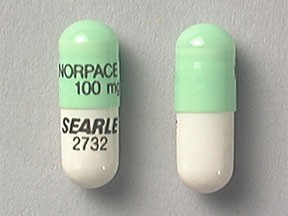
- color
- light green
- shape
- oblong
- imprint
- NORPACE CR 100 mg, SEARLE 2732

- color
- light green
- shape
- oblong
- imprint
- NORPACE CR 100 mg, SEARLE 2732
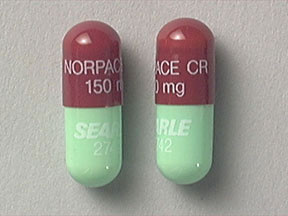
- color
- light green
- shape
- oblong
- imprint
- NORPACE CR 150 mg, SEARLE 2742

- color
- light green
- shape
- oblong
- imprint
- NORPACE CR 150 mg, SEARLE 2742
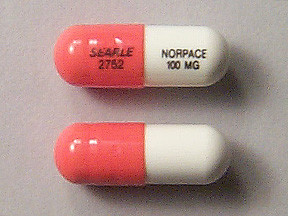
- color
- orange
- shape
- oblong
- imprint
- SEARLE 2752, NORPACE 100 MG
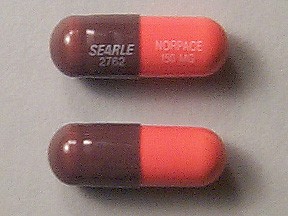
- color
- orange
- shape
- oblong
- imprint
- SEARLE 2762, NORPACE 150 MG

- color
- scarlet
- shape
- oblong
- imprint
- 93 3127, 93 3127
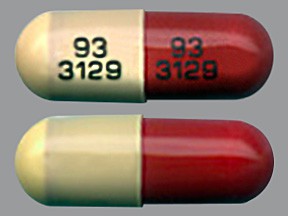
- color
- buff
- shape
- oblong
- imprint
- 93 3129, 93 3129

- color
- scarlet
- shape
- oblong
- imprint
- 93 3127, 93 3127
Reviews
Faq for DISOPYRAMIDE - ORAL
- Disopyramide is an oral medication used to treat certain heart rhythm disorders, such as ventricular arrhythmias.
- Disopyramide works by blocking certain electrical signals in the heart, which helps to stabilize and regulate the heart's rhythm.
- Common side effects of disopyramide may include dry mouth, constipation, blurred vision, dizziness, or nausea. These side effects are usually mild and go away on their own.
- It is generally not recommended to take disopyramide during pregnancy or while breastfeeding, as it may have potential risks for the baby. It is important to consult with a healthcare provider for personalized advice.
- If you miss a dose, take it as soon as you remember. However, if it is almost time for your next scheduled dose, skip the missed dose and continue with your regular dosing schedule. Do not double dose to make up for a missed dose.
- Disopyramide may have interactions with other medications, including other heart medications, anticholinergic drugs, and certain antibiotics. It is crucial to inform your healthcare provider about all the medications you are taking to avoid potential interactions.
- The onset of action for disopyramide may vary from person to person, but it typically takes a few days to a couple of weeks for the medication to reach its full therapeutic effect. It is important to continue taking the medication as prescribed by your healthcare provider.
- Disopyramide should not be stopped abruptly without consulting a healthcare provider. Sudden discontinuation of the medication can lead to worsening of the underlying heart condition. It is important to follow the guidance of your healthcare provider when discontinuing or adjusting the dosage of disopyramide.
- There are no specific dietary restrictions associated with disopyramide. However, it is always recommended to maintain a balanced and healthy diet as advised by your healthcare provider.
- Although rare, disopyramide can potentially cause allergic reactions in some individuals. If you experience signs of an allergic reaction such as rash, itching, swelling, severe dizziness, or difficulty breathing, seek immediate medical attention.
Warning
WARNING: Though this medication often gives great benefits to people with irregular heartbeat, it may rarely cause a serious new irregular heartbeat. Therefore, when starting treatment with this drug, your doctor may recommend that you stay in the hospital for proper monitoring and emergency medical treatment if needed. Talk with your doctor about the benefits and risks of taking this medication.
Disclaimer
IMPORTANT: HOW TO USE THIS INFORMATION: This is a summary and does NOT have all possible information about this product. This information does not assure that this product is safe, effective, or appropriate for you. This information is not individual medical advice and does not substitute for the advice of your health care professional. Always ask your health care professional for complete information about this product and your specific health needs.
No Reviews Yet